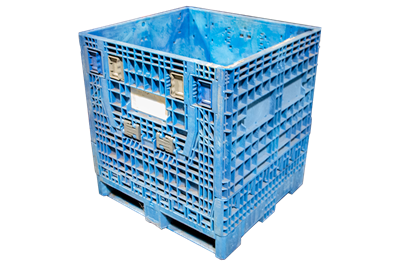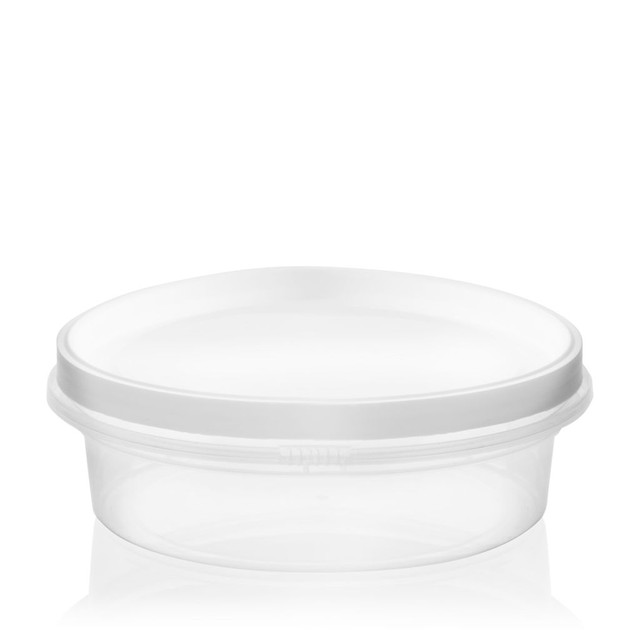Find out how plastic bulk containers can save time for your operations
A Comprehensive Guide to the Different Kinds of Bulk Plastic Containers Available Today
Mass plastic containers play an essential role in numerous markets, using options for storage and transport. Their varied kinds accommodate various requirements, from inflexible alternatives for strong products to versatile containers fitting different forms. Each type presents distinctive advantages, making it important to recognize their applications and functions. As markets evolve, so do the demands for effective container remedies. What variables should one think about when selecting the ideal bulk container?
Review of Mass Plastic Containers

Kinds Of Mass Plastic Containers
Mass plastic containers been available in different forms, each fit to certain applications. Inflexible mass containers, flexible bulk containers, and intermediate bulk containers represent the key categories, each offering distinct advantages. Comprehending these types is vital for choosing the right container for delivering and saving products.

Inflexible Mass Containers
Stiff bulk containers are essential for effective storage space and transportation of numerous products throughout sectors. These containers are usually created from resilient plastics, enabling them to hold up against harsh handling and environmental conditions. They are available in various shapes and sizes, including drums, totes, and bins, making them ideal for keeping whatever from granular compounds to liquids. Inflexible containers typically feature enhanced walls and secure lids, ensuring the contents remain secured during transit. Their stackable design makes the most of storage room, making them suitable for storage facilities and making centers. Furthermore, numerous inflexible mass containers are recyclable and multiple-use, adding to sustainability efforts. On the whole, their effectiveness and adaptability make rigid bulk containers an important element in supply chain procedures.
Versatile Bulk Containers
Flexible mass containers, typically described as flexible intermediate mass containers (FIBCs), function as a flexible service for keeping a selection and carrying of completely dry products. These containers are generally made from woven polypropylene and are made to be lightweight yet solid, enabling reliable handling and stacking. Their adaptability allows them to accommodate various sizes and shapes, making them suitable for products varying from grains to chemicals. FIBCs can be equipped with functions such as spouts for very easy filling and discharge, along with protective layers for enhanced sturdiness. In addition, they are reusable and recyclable, contributing to sustainable methods in sectors like agriculture, food processing, and building. Generally, versatile mass containers supply a affordable and effective alternative for mass material management.
Intermediate Bulk Containers
Intermediate bulk containers (IBCs) are vital for the efficient transportation and storage of liquids and granular materials throughout different sectors. These containers commonly have a capacity ranging from 275 to 330 gallons and are designed for easy stacking and taking care of. Made from resilient products like high-density polyethylene or steel, IBCs give excellent security versus contamination and ecological aspects. Their layout includes features such as a built-in pallet for forklift gain access to and a detachable top for very easy dental filling and cleaning. IBCs are commonly utilized in chemical, food, and pharmaceutical fields, making sure conformity with security policies. Their adaptability and reusability make them an economical remedy for mass storage space and transportation, adding to provide chain performance and sustainability.
Attributes and Benefits of Mass Plastic Containers
Bulk plastic containers are crucial devices in various sectors, using a combination of durability and usefulness. These containers are built from top quality materials, making them resistant to influences, chemicals, and environmental variables. This robustness warranties item safety during storage space and transport.
Furthermore, mass plastic containers are light-weight, assisting in simplicity of decreasing and handling shipping costs. Their stackable style optimizes storage efficiency, permitting enhanced warehouse room. Many versions feature safe and secure lids or closures, supplying an impermeable seal that stops and preserves components contamination.
Bulk plastic containers are recyclable and frequently recyclable, adding to lasting methods. Their convenience allows for a vast array of applications, from food storage space to commercial usage, boosting their worth across industries. Organizations gain from the long life-span and reduced maintenance needs of these containers, making them a cost-efficient solution for both short-term and long-lasting demands.
Industries That Make Use Of Mass Plastic Containers
Various industries benefit from using bulk plastic containers, each leveraging their special residential properties for details applications. The food and beverage sector depends on these containers for safe storage and transportation of items, while the chemical manufacturing industry utilizes them for handling hazardous materials. Furthermore, the pharmaceutical circulation requires emphasize the relevance of durability and cleanliness in packaging services.
Food and Beverage Market
As the need for reliable and secure storage space remedies continues to rise, the food and drink sector significantly relies upon mass plastic containers for their functional requirements. These containers offer robust, light-weight, and flexible options for storing ingredients, finished items, and waste products. Made from food-grade materials, they guarantee conformity with health and wellness criteria. Various layouts, such as stackable bins and tote boxes, maximize room throughout transportation and storage, boosting logistical effectiveness. Furthermore, the transparency of some mass containers enables for easy supply administration, reducing the threat of putridity. With the sector's focus on sustainability, several makers are now using reusable and recyclable alternatives, aligning with environmentally friendly methods while meeting the high needs of food security and health.
Chemical Production Sector
The chemical manufacturing field relies heavily on mass plastic containers for the safe and effective storage space of resources, intermediates, and completed items. These containers are developed to endure different chemicals, ensuring that dangerous products do not leakage or weaken the container itself. Common types include high-density polyethylene (HDPE) and polypropylene containers, which use excellent chemical resistance and toughness. Their lightweight nature and stackable design assist in transportation and storage space, enhancing room in manufacturing facilities. In addition, many bulk plastic containers include functions such as tamper-evident seals and easy-to-read labeling, boosting safety and compliance with market laws. Generally, mass plastic containers are integral to the chemical manufacturing process, supplying dependable options for taking care of diverse substances.
Pharmaceutical Distribution Requirements
Drug circulation counts on bulk plastic containers to meet rigid safety and security and regulative needs. These containers are essential for keeping a range and carrying of pharmaceutical products, including energetic pharmaceutical active ingredients (APIs) and ended up medicines. Their design warranties protection versus dampness, contamination, and light, preserving the honesty of delicate materials. Additionally, bulk plastic containers are certified with industry requirements such additional hints as Great Production Practices (GMP) and are frequently made from products that are FDA-approved. The use of these containers enhances effectiveness in the supply chain, permitting safe, large circulation while decreasing waste. Companies in the pharmaceutical market focus on the usage of long lasting, watertight, and tamper-evident containers to ensure product safety and top quality throughout the logistics process.
Factors to consider for Picking the Right Container
When choosing the appropriate bulk plastic container, various variables must be carefully evaluated to ensure perfect performance and safety. The nature of the materials to be kept is paramount; compatibility with the container's product can influence stability and safety and security. Bulk Plastic Containers. Furthermore, the container's dimension and form need to line up with the storage space and transportation demands, guaranteeing efficient space usage
Load ability is another important consideration, as it ought to fit the weight of components without danger of damage or failure. The layout attributes, such as airing vent or covers, can impact usability and accessibility. Compliance with sector laws is important, specifically in markets like pharmaceuticals, where security requirements are rigorous.
Lastly, the expected life-span and resilience of the container need to be assessed to confirm it satisfies the operational needs without frequent substitute. By assessing these factors, one can choose one of the most appropriate mass plastic container for particular applications.
Ecological Impact and Sustainability
As businesses progressively focus on sustainability, the ecological impact of mass plastic containers has actually come under analysis. These containers, frequently made from products such as polyethylene or polypropylene, add significantly to plastic waste if not managed effectively. Their production entails the intake of fossil gas, which can cause enhanced greenhouse gas discharges. Nonetheless, improvements in reusing modern technology and the advancement of naturally degradable choices are helping to reduce these concerns.
Additionally, lots of manufacturers are embracing methods that emphasize using recycled materials, thus minimizing the need for virgin plastics. The longevity of mass plastic containers also contributes; they are developed to be reused multiple times, which can decrease their overall environmental impact when compared read what he said to single-use options. Eventually, the sector encounters the difficulty of stabilizing capability with ecological obligation, making lasting techniques necessary for the future of bulk plastic containers.
Finest Practices for Storage Space and Transport
Efficient storage space and transport of mass plastic containers considerably influence both functional efficiency and sustainability. To make the most of room, organizations need to stack containers safely, guaranteeing stability and preventing damage. Appropriate labeling is crucial for very easy recognition, which enhances access processes. Additionally, preserving a clean and organized storage area lowers the risk of contamination and enhances security.
For transportation, selecting the best lorry is important; containers should be protected to prevent changing hop over to here throughout transit. Business ought to also consider making use of pallets to assist in simpler loading and unloading. Normal inspections of containers for deterioration can stop expensive substitutes.
Temperature control is one more vital aspect, as extreme conditions can jeopardize the honesty of the plastic. Training workers on finest techniques for handling and transportation guarantees conformity and promotes a society of safety. By implementing these finest techniques, organizations can boost their operational effectiveness while contributing to ecological sustainability.
Frequently Asked Concerns
Just how Do I Tidy Bulk Plastic Containers Effectively?
To tidy mass plastic containers properly, one ought to wash them with warm water, make use of a moderate cleaning agent and scrub with a soft brush. Wash thoroughly, then enable to air completely dry entirely before storage or reuse.
What Is the Life Expectancy of Bulk Plastic Containers?
The life expectancy of bulk plastic containers commonly varies from 5 to one decade, depending upon the material, use, and ecological conditions. Appropriate upkeep and storage space can substantially extend their use and toughness with time.
Can Mass Plastic Containers Be Customized?

Do Bulk Plastic Containers Have Guarantee Options?

Exist Rules for Making Use Of Mass Plastic Containers?
Yes, laws exist for making use of bulk plastic containers, mostly concentrated on safety and security, ecological impact, and product conformity. These policies ensure that containers fulfill sector criteria and are suitable for transporting various compounds safely and efficiently.
Stiff bulk containers, versatile mass containers, and intermediate mass containers represent the main categories, each offering one-of-a-kind advantages. Flexible mass containers, typically referred to as adaptable intermediate mass containers (FIBCs), serve as a versatile remedy for storing a selection and transferring of dry materials. The chemical production field relies heavily on bulk plastic containers for the efficient and risk-free storage space of raw materials, intermediates, and finished products. Bulk Plastic Containers. These containers are created to hold up against numerous chemicals, ensuring that harmful materials do not leak or break down the container itself. In addition, bulk plastic containers are certified with market requirements such as Good Production Practices (GMP) and are commonly made from products that are FDA-approved